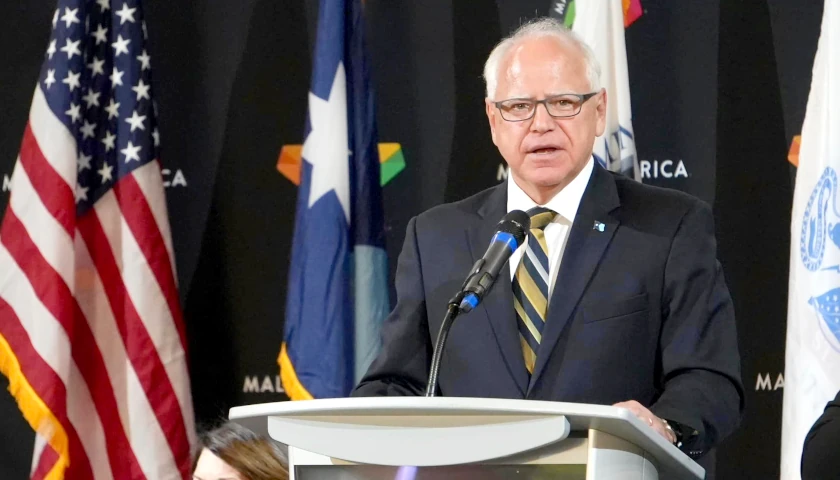by Hank Long
A universal school lunch bill that’s fast-tracking its way through the Minnesota Legislature received an official price tag this week.
HF5/SF123 would ensure all K-12 students are served free breakfast and lunch in public schools, regardless of family income. It would also cost the state $387 million over the next two years and nearly $419 million in the subsequent two-year budget cycle. That’s according a non-partisan fiscal analysis provided to legislators in the House Education Finance Committee on Wednesday.
The universal school meals provision is included in Gov. Tim Walz’s proposed budget that he has continued to roll out in doses this month. Minnesota would join California and Maine as the only states in the nation that ensure free school meals are served for all students in perpetuity, following expiration last fall of a federal, pandemic-era program that provided free school meals for all.
The House Education Finance Committee approved the bill on a voice vote. It received no vocal backing from Republicans in the committee, who continue to say the proposed legislation offers a one-size-fits-all approach that leans too heavily on current budget surplus dollars.
“We’re all for feeding kids, but the concern is the long-term implications,” said Rep. Ben Bakeberg, R-Jordan, a former public school principal. “We have a significant budget surplus now. But we won’t have that surplus in years to come, and that will come with consequences. And will mean less opportunities for our kids.”
Despite that concern, DFL legislators celebrated the momentum of a bill that now moves onto one more committee before it’s expected to be taken up for a vote on the House floor. The bill was due for a hearing in the Senate Education Finance Committee later this week.
“This is a historic moment in the state of Minnesota,” said Rep. Heather Edelson, DFL-Edina, a House Education committee member who voted in support of the universal school lunch bill. “Food is absolutely a basic human right … so many students across the state of Minnesota will be celebrating this today.”
Edina Public Schools, which sits in Rep. Edelson’s legislative district, has one of the lowest percentages of students in the state that qualify for free and reduced lunches — 8.7 percent. In Edina Public Schools, breakfasts cost about $2 and lunches cost about $3.
About one-third of students in Minnesota qualify for free or reduced lunch programs that are already in place, according to the Minnesota Department of Education. That’s the rub that has Republicans in House and Senate education committees continuing to express skepticism as to whether a free school-meals-for-all program is even necessary when means-tested free school lunch programs already exist.
Currently, federal guidelines provide that children from households of four that have income under $36,000 qualify for free meals at school. Reduced price meals are available to households of four that earn under $51,000 annually. Also, the federal government already allows eligible districts and schools in low-income areas to provide school lunch and breakfast at no charge to all students, including schools where at least 62.5% of its students are from households that receive income-based assistance programs. The USDA reimburses those districts that qualify under its Community Eligibility Provision.
Several DFL legislators and testifiers on the universal school meals bill shared stories about parents who are too embarrassed to fill out free and reduced school lunch eligibility forms for their children and others whose incomes are just above the threshold for eligibility but are struggling to make ends meet.
Republicans in the hearing continued to express concern over the long-term costs of a free school-meals-for-all program.
Rep. Peggy Bennett, R-Albert Lea, said the bill’s DFL sponsors are offering a “shotgun-type solution” to a problem that requires a more “surgical type of solution where we address those families and possibly raise the eligibility threshold and loop them in to make sure those kids are fed.”
“At some point we’re not going to have this huge surplus,” said Bennett, a former teacher. “And then suddenly we’re competing with (funding) lunches for kids who can pay for them and providing mental health services or having to cut staff. I just don’t believe this bill is the proper solution.”
– – –
Hank Long is a journalism and communications professional whose writing career includes coverage of the Minnesota legislature, city and county governments and the commercial real estate industry. Hank received his undergraduate degree at the University of Minnesota, where he studied journalism, and his law degree at the University of St. Thomas. The Minnesota native lives in the Twin Cities with his wife and four children. His dream is to be around when the Vikings win the Super Bowl.
Photo “School Lunch” by Yan Krukau.





